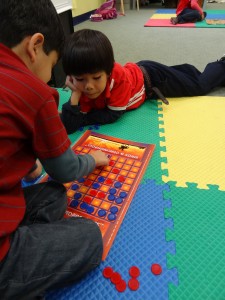The Mathematics Pentathlon® Games were created to be sensitive to the developmental differences and learning styles of students. Since the Mathematics Pentathlon Program addresses a broad range of student needs, we refer to it as robust. This attribute of robustness enables the Pentathlon Program to achieve significant results with students of varying abilities and learning styles who may be labeled gifted or talented, average, learning disabled, or “at-risk.” The Mathematics Pentathlon® Program also provides educational experiences that promote the involvement of girls and/or minority students in mathematics.
Some students who have excellent non-verbal and/or spatial reasoning abilities can often be either uninterested and/or poorly skilled in verbal and quantitative skills. Although these students may not perform well in conventional academic settings, they are attracted to the Mathematics Pentathlon® Program often requires non-verbal/spatial thinking skills. This attraction motivates such students to become involved with the computational aspects of the games. In the process, these students also become involved with various aspects of logical/scientific reasoning. Many of these students can then improve their mathematics skills in their conventional academic settings. A significant factor in enabling these students to improve their overall performance in mathematics is based on their enjoyment of math while playing the games. This in turn, results in more time-on-task thinking mathematically that leads to their development of confidence in math and self-esteem. Students of average academic performance may be similarly motivated since they often view the spatial and logical aspects of mathematics as fun. Many of these students incorrectly perceive these aspects as non-mathematical believing that mathematics only involves quantitative skills. Frequently, students who excel academically, also share this view. Such students, who may have succeeded in formal instruction, testing, and/or computationally-oriented competitions, find the Active Problem-Solving feature of the Mathematics Pentathlon Program to be a new challenge. In accepting such a challenge, these students are motivated to develop and refine their logical and spatial reasoning abilities.
Overall, the Active Problem-Solving feature fascinates most students who become involved with the Mathematics Pentathlon® Program. Students involved with this program not only develop a broad range of mathematics skills but also a maturity in working with others due to the program’s emphasis on cooperation and constructive competition.
